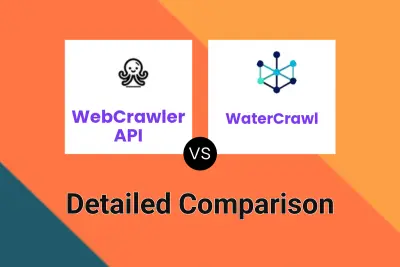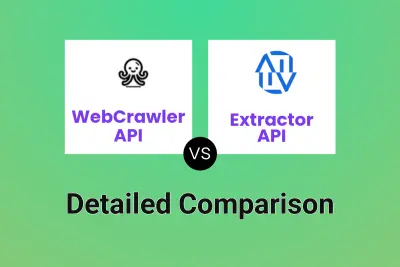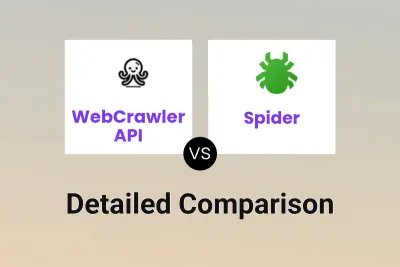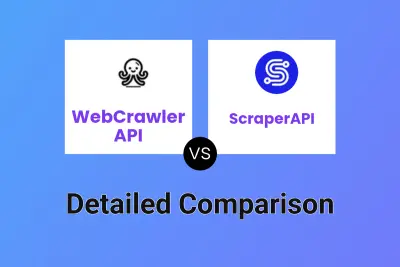 WebCrawler API
VS
WebCrawler API
VS
 Spider
Spider
WebCrawler API
Navigating the complexities of web crawling, such as managing internal links, rendering JavaScript, bypassing anti-bot measures, and handling large-scale storage and scaling, presents significant challenges for developers. WebCrawler API addresses these issues by offering a simplified solution. Users provide a website link, and the service handles the intricate crawling process, efficiently extracting content from every page.
This API delivers the scraped data in clean, usable formats like Markdown, Text, or HTML, specifically optimized for tasks such as training Large Language Model (LLM) AI models. Integration is straightforward, requiring only a few lines of code, with examples provided for popular languages like NodeJS, Python, PHP, and .NET. The service simplifies data acquisition, allowing developers to focus on utilizing the data rather than managing the complexities of crawling infrastructure.
Spider
Leverage a powerful data collecting solution engineered for exceptional speed and scalability. Built entirely in Rust, this platform provides next-generation performance, capable of crawling tens of thousands of pages rapidly in batch mode. It is specifically designed to enhance AI projects by providing efficiently gathered web data, aiming to significantly improve speed, productivity, and efficiency compared to standard scraping services, while also being more cost-effective.
The system offers seamless integration capabilities with a wide range of platforms, including major AI tools and services such as LangChain, LlamaIndex, CrewAI, FlowiseAI, AutoGen, and PhiData, ensuring data curation aligns perfectly with project requirements. It features concurrent streaming to save time and minimize bandwidth concerns, especially beneficial when crawling numerous websites. Users can obtain clean and formatted content in various formats like Markdown, HTML, or raw text, ideal for fine-tuning or training AI models. Additional performance boosts come from HTTP caching for repeated crawls and a 'Smart Mode' that dynamically utilizes Headless Chrome for pages requiring JavaScript rendering.
Pricing
WebCrawler API Pricing
WebCrawler API offers Usage Based pricing .
Spider Pricing
Spider offers Free Trial pricing .
Features
WebCrawler API
- Automated Web Crawling: Provide a URL to crawl entire websites automatically.
- Multiple Output Formats: Delivers content in Markdown, Text, or HTML.
- LLM Data Preparation: Optimized for collecting data to train AI models.
- Handles Crawling Complexities: Manages JavaScript rendering, anti-bot measures (CAPTCHAs, IP blocks), link handling, and scaling.
- Developer-Friendly API: Easy integration with code examples for various languages.
- Included Proxy: Unlimited proxy usage included with the service.
- Data Cleaning: Converts raw HTML into clean text or Markdown.
Spider
- High-Speed Crawling: Built in Rust for scalability and speed (crawls 20k+ pages in batch mode).
- Concurrent Streaming: Efficiently streams results concurrently, saving time and bandwidth.
- Multiple Response Formats: Outputs clean Markdown, HTML, raw text, JSON, JSONL, CSV, and XML.
- Seamless Integrations: Compatible with LangChain, LlamaIndex, CrewAI, FlowiseAI, AutoGen, PhiData, and more.
- Smart Mode: Dynamically switches to Headless Chrome for JavaScript-heavy pages.
- AI Scraping (Beta): Enables custom browser scripting and data extraction using AI models.
- HTTP Caching: Caches repeated page crawls to boost speed and reduce costs.
- Cost-Effective: Offers significant cost savings compared to traditional scraping services.
- Robots.txt Compliance: Adheres to robots.txt rules by default (can be disabled).
Use Cases
WebCrawler API Use Cases
- Training Large Language Models (LLMs)
- Data acquisition for AI development
- Automated content extraction from websites
- Market research data gathering
- Competitor analysis
- Building custom datasets
Spider Use Cases
- Gathering real-time web data for AI agents and LLMs.
- Collecting formatted data (Markdown, text) for training AI models.
- Executing large-scale web scraping projects efficiently.
- Integrating web data extraction into automated data pipelines.
- Building datasets for machine learning applications.
- Automating data collection for market research and analysis.
Uptime Monitor
Uptime Monitor
Average Uptime
99.71%
Average Response Time
263.1 ms
Last 30 Days
Uptime Monitor
Average Uptime
100%
Average Response Time
160 ms
Last 30 Days
WebCrawler API
Spider
More Comparisons:
-

WebCrawler API vs WaterCrawl Detailed comparison features, price
ComparisonView details → -

WebCrawler API vs Extractor API Detailed comparison features, price
ComparisonView details → -

WebCrawler API vs Spider Detailed comparison features, price
ComparisonView details → -

WebCrawler API vs ScraperAPI Detailed comparison features, price
ComparisonView details →
Didn't find tool you were looking for?